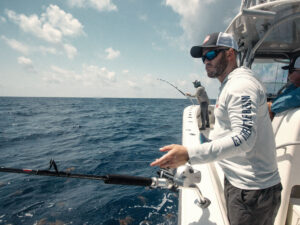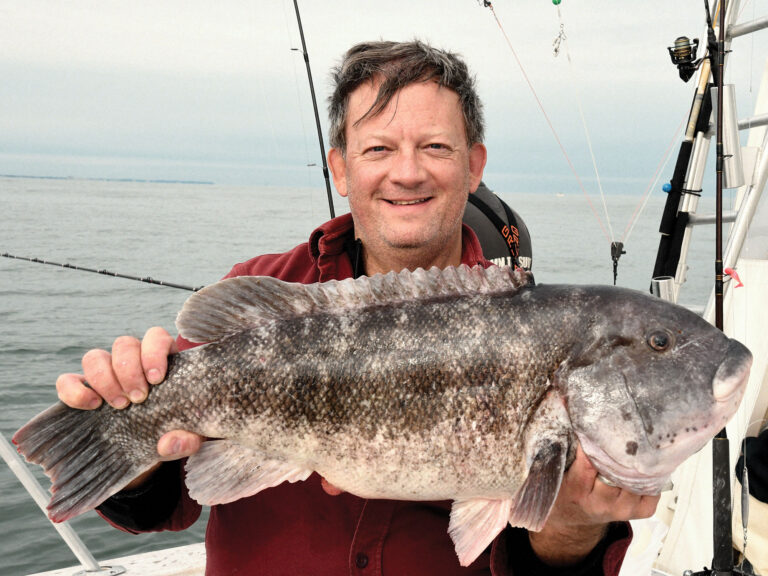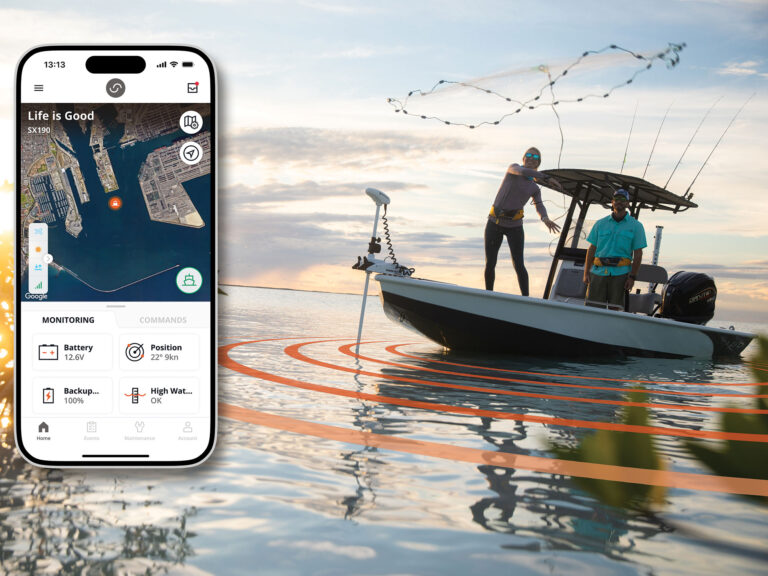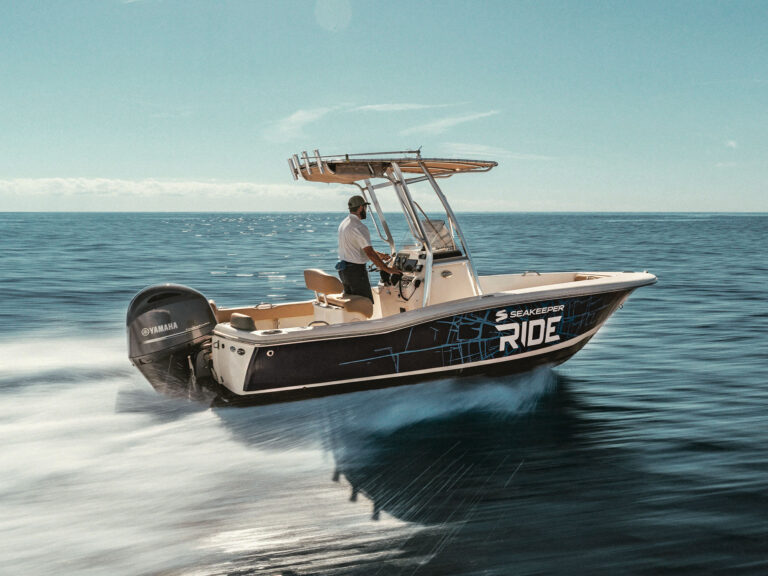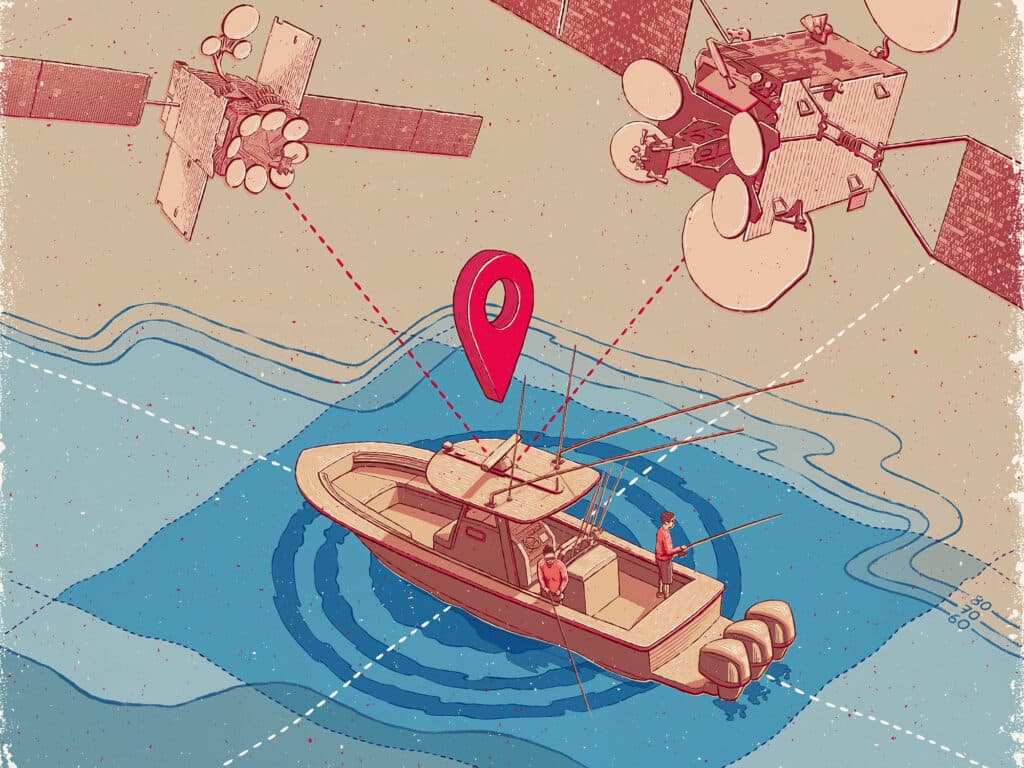
The ability to stay electronically connected has profoundly changed the way we live, work, socialize, and share ideas and information. But staying in touch in the digital age can prove challenging for boating anglers far from shore, outside of cell coverage or VHF radio range from other boats.
Today, products using satellite technology provide the go-to solution. Available in a wide array of configurations and pricing, these marine-grade satcom systems enable global communications so boating anglers can stay connected, no matter where their fishing adventures take them.
While some anglers might relish the radio silence and a break from electronic leashes, others want to stay connected with family, friends, work associates and other boating anglers. In addition, prudent seamanship dictates the need to possess a means to hail rescue agencies if beset by an emergency.
There are essentially two levels of marine satcom:
- Big dome antenna systems are designed for yachts and carry substantial price tags for the equipment, installation and satellite service.
- Simpler, more affordable, compact and often portable products are better suited for smaller boats and limited budgets.
Many integrate with mobile devices to enable a satellite interface. All require satellite subscription plans to keep you connected. Keep reading for examples of relatively affordable and portable satcom systems for boating anglers.
Quicklook: 7 Affordable Boating Satcom Systems
- ACR Bivy Stick
- Garmin inReach Mini 2 Bundle
- Icom Sat 100 Radio
- Iridium Go
- IsatPhone 2 Phone
- Spot X
- Zoleo Communicator
ACR Bivy Stick
The compact, waterproof and portable Bivy Stick from ACR wirelessly turns your cellphone into a satellite communication device. It can access the popular Iridium satellite network anywhere you have a view of the sky. Bivy Stick features include two-way text messaging, an SOS button to contact the Bivy Global Rescue Center, location sharing, one-touch check-in with your contacts, and detailed weather reports sent to your cellphone via satellite. It provides you with a dedicated phone number and email so that others can reach you.
You can also activate the SOS feature through the Bivy app. It is available with a wide variety of mounting options, as well as a portable and lightweight solar panel for recharging the Bivy Stick in case your boat’s electrical power goes out. It sells for $299.99, plus a satellite service plan that starts at as little as $14.99 per month; acrartex.com.
Garmin inReach Mini 2
The new inReach Mini 2 Marine Bundle from Garmin is a satellite communication and navigation device with two-way messaging and SOS capabilities bundled with a helm mount. In an emergency, boaters can trigger an interactive SOS message requesting assistance sent to the Garmin International Emergency Response Coordination Center.
The inReach Mini 2 automatically records activities and passively stores routes traveled. The TracBack feature guides boaters back to their point of origin. Measuring 4 inches tall by 2 inches wide, the IPX7 waterproof-rated device wirelessly pairs with Garmin GPSMap series chart plotters and the quatix 7 series marine GPS smartwatches. The bundle includes an internal, rechargeable lithium battery and a 12-volt power cable. The retail price is $449.99, with plans as low as $11.95 per month; garmin.com.
Icom Sat 100 Radio
Icom, well-known for its handheld and fixed-mount VHF radios, has partnered with Iridium Communications to offer a unique satellite push-to-talk handheld radio, the Sat 100. Waterproof and similar in size to a handheld VHF, but with a slightly larger-diameter antenna, the Sat 100 lets boaters who voyage to remote and isolated destinations communicate virtually anywhere on Earth, be it aboard a mothership, a tender or ashore.
Iridium’s satellite network enables the Sat 100 to also maintain communications in the face of large-scale disasters that might disrupt terrestrial networks. The Sat 100 is available through Icom’s retail network and sells for around $1,260. Iridium service is required for satellite communications, with plans available as low as $71.99 a month with a one-year minimum term; icomamerica.com.
Iridium Go
Tapping into the Iridium satellite network for worldwide connectivity, the Iridium Go serves as a compact, portable and waterproof onboard Wi-Fi hotspot for voice calling and text messaging with your smartphone using the Iridium Go app. It also offers the ability to send one-touch SOS alerts for 24/7 emergency assistance, access GPS data, and receive weather forecasts. Measuring 4.5 inches long by 3.23 inches wide by 1.26 inches tall, the satcom unit features a stable lay-flat design, a flip-up antenna and a simple user interface. The rechargeable battery provides up to five and a half hours of talk time. Starting at about $855, plus a service plan as low as $65 per month; iridium.com.
IsatPhone 2 Phone
The Inmarsat IsatPhone 2 satcom portable phone offers voice and text messaging, SOS alerting and location tracking at an affordable price point, with nearly worldwide coverage with the Inmarsat satellite network.
Featuring up to eight hours of talk time on the rechargeable battery, the weather-resistant IsatPhone 2 is engineered to withstand extreme environments, including temperatures as cold as 28 degrees F, and can tolerate up to 95 percent humidity. Its affordable price point and near-global coverage makes the IsatPhone 2 a great choice for personal use aboard your boat.
Like other portable satellite communicators, the IsatPhone 2 requires a clear line of sight to the sky to connect with Inmarsat’s geostationary equatorial satellites. It sells for $899, plus a SIM card with an airtime plan starting at around $45 per month; inmarsat.com.
Spot X
The compact, portable and waterproof Spot X device can serve as a stand-alone two-way satellite messaging device to communicate with family, fishing buddies and business colleagues, as well as provide 24/7 search-and-rescue services in case of a boat emergency or distress situation. This SOS feature also enables you to message back and forth about the nature of your emergency and receive confirmation when help is on the way.
In addition to the stand-alone functionality, you can wirelessly connect your smartphone to the device via the Spot X app to convert your phone into a satphone. Spot X provides you with a personal mobile US phone number so others can message you directly from their cellphones or other SMS devices at any time. It sells for $249.99, plus a service plan starting as low as $11.95 per month; findmespot.com.
Zoleo Communicator
The compact, portable and waterproof satellite communicator from Zoleo is designed to provide seamless global messaging, SOS alerting and location awareness with 100 percent global coverage. The Zoleo also connects with your mobile device to provide messaging that follows you in and out of cell coverage by using Wi-Fi, cell service and the Iridium satellite network for seamless conversations. It pairs with mobile devices via Bluetooth and the free Zoleo app. This lets you message your contacts, check weather forecasts and share your GPS coordinates. It offers more than 200 hours of battery life on a single charge and sells for $199.99, plus service plans starting at $20 per month for 25 satellite messages; zoleo.com.
FAQ
What is satcom?
Satcom is short for satellite communications, which refers to the use of artificial satellites orbiting the Earth to enable communication and data transfer between different points on the globe. The technology is crucial for facilitating various services, including voice, data, and video transmission.
How does a satcom radio work?
A satcom radio works by establishing a wireless communication link with a satellite in orbit. It transmits and receives signals to and from the satellite, which then relays the signals to a ground station or another satcom radio, allowing for long-distance communication beyond the line of sight.
What frequency does satcom use?
Satcom systems operate in various frequency bands, but the most common are:
1) L-band (1-2 GHz), which is used for mobile satellite services and global positioning systems
2) C-band (4-8 GHz) for commercial communications and television broadcasting
3) Ku-band (12-18 GHz) and Ka-band (26.5-40 GHz), which are for high-bandwidth applications, like internet and video transmission




